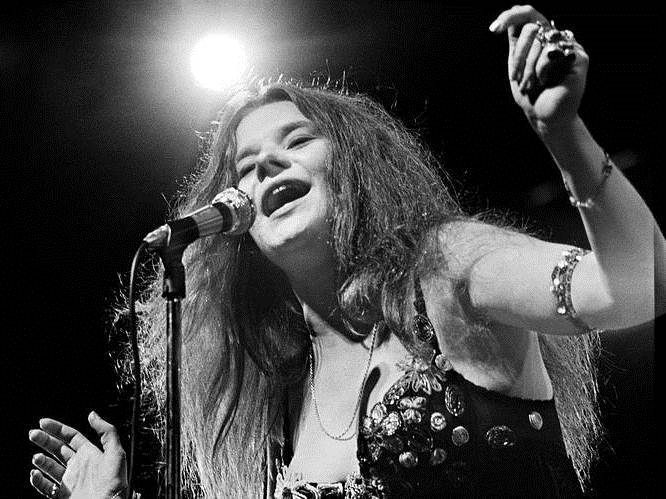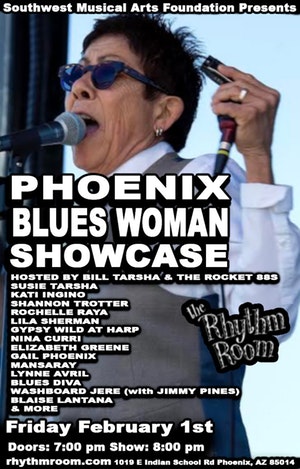The piece about Janis was supposed to come out last week, close to her birthday. No rules say we have to post on the birthday. So here it is. She was a dandy. A charter member of the 27 Club, she would have been 76 this year.
I can't begin to tell you how proud of Cros, our representative at the IBC this year. They made it into the final eight bands out of approximately 200 + entrants. They didn't capture the top spot but their future looks bright. Way to go guys!!
I did get to attend the IBC this year. Beale Street is a fascinating place. Go there.
And here is the link to Blues Blast '19 ticket...drum roll please...https://bit.ly/2Rn01N7
The pace is becoming more and more hectic as we approach BB '19. Get your volunteer shoes out and get in on it.
Have a week!!
Jim Crawford, PBS
|
 |
 |
 Janis
by Sheila Weller Drug overdoses distort the essence of a famous person's short life. The stigma is perhaps even stronger for women, since excessive drug use is . . . well, unladylike. Thus, Janis Joplin has for decades resided in our collective memory as the'60s Belter," swigging her Wild Turkey with her huge, wide, indiscriminately welcoming smile. Full-on swagger. Famous stories about her include Grateful Dead members ungallantly laughing (in various interviews) about her noisy hookups with their bandmate Pigpen. Janis: the merry, bawdy, rowdy middle-finger-giver to rectitude and thoughtfulness. This was not all-or even most-of who Janis Joplin was. The prolific nonfiction filmmaker Amy Berg's new documentary about Joplin's life, Little Girl Blue-opening in major cities November 27-movingly debunks this patronizing, clichéd, one-dimensional image. Having had my instincts about the true Janis Joplin validated by this film, I spoke with a few of the singer's friends, who reinforced the picture of a vulnerable, thoughtful, dignified "hidden" Janis that the film brought to life. "Janis was a 'good girl,'" recalls Viva Hoffmann, who spent the 60s as an Andy Warhol superstar. "I only met her once, at Max's, where"-at the height of her fame-"she begged me to come to her performance and bring Andy, saying, 'I want to have some people in the audience!' I could tell by her plaintive request that she was a sweet, naïve girl." "She got a kick out of playing the bad girl but she wasn't a bad girl," is how her childhood friend from Port Arthur, Texas, J. Dave Moriarty, put it. And Patricia Morrison, the widow of Jim Morrison (who also died, like Joplin and Jimi Hendrix, at 27, in that same 10-month period) and a music-magazine editor in chief in the late 60s, tells me, "What most people don't know is Janis was a smart, bright lady. Intelligent, very sensitive, and alive to everything around her-which also meant sensitive and alive to her own pain. She was so vulnerable." "We both were hard drinkers. We both swore our brains out, and we would cackle with laughter about stuff," Joplin's fellow Summer of Love chick-singer nonpareil Grace Slick told me a few years ago. But, Slick said, there was always a "sadness" to Janis that she never inquired about. Berg's film-narrated by Chan Marshall, also known by her stage name, Cat Power-shows teenaged Janis Joplin as the beehived cusp-of-60s girl: a good student, college-bound. (She would enroll at a local college and then transfer to the University of Texas at Austin.) "She ran with a tight group who hung out with books and ideas," her younger sister, Laura, says in the film. "Janis was an intellectual-she was reading F. Scott Fitzgerald the night just before she died," says Peter Newman, the producer of the Noah Baumbach film The Squid and the Whale. Newman has been trying to make a Joplin biopic for 20 years. He acquired the rights all those years ago, and he still possesses them, yet the studios' concern about her drug use is one of the reasons the film has yet to be made. (Of course Ray Charles and Johnny Cash were drug users, too, and recent, highly praised biopics of them stressed their humanity and excused their addictions.) Joplin was the daughter of college-graduate émigrés from the East Coast who'd settled in Port Arthur, Texas, for work opportunities. (Both are now deceased.) Her father, Seth, was an engineer for Texaco. Her mother, Dorothy, was a business-college registrar. Joplin was a member of her high school's Slide Rule Club and a gifted artist, whose sketches and bookishness won her a profile in the Port Arthur paper, headlined "Library Job Brings Out Teen's Versatility." She was not conventionally pretty, and the most painful thing in her youth was a sadistic "honor" a group of boys conferred upon her: "Ugliest Man on Campus." In the canon of Janis Joplin's vulnerability, this was the foundational cruelty. Her sensitivity and transparent neediness may have been part of her charm, her lore, and her gut-level emotional appeal, but far less known is how articulate and thoughtful she was. Despite all the swearing and raucous laughter that Slick fondly recalled, introspection and abashment were part of the Janis hidden from her fans. "I'm attempting to find a semblance of a pattern in my life," she wrote in one letter to her parents. In another she wrote: "It is with a great deal of trepidation [that I tell you] I'm in San Francisco." These college-girl sentences spilled from her pen in private moments-and out of her mouth: her natural speaking voice-as revealed in her interviews with Dick Cavett (a close friend, who may, he says, have also been her lover)-bore a hint of the formal enunciation that the Mad Men actors strove for. Today, in upspeak 2015, it's charmingly jarring to hear such tonal propriety from the lips of the girl who belted out "Bay-by, bay-by, baaaaay-by . . ." in homage to Otis Redding and who loved nothing more than being compared to Billie Holiday, Bessie Smith, and Aretha Franklin. That proper voice reminds us, as does this documentary, that the barn-burning counterculture was, in retrospect, a more modest step away from the past than its stars liked to imagine. It is in her letters to her family that the secret dignity of Joplin comes through the clearest. "Dear Family," and, often, "Dear Mother," Joplin wrote, in missives full of quaintness and obeisance. For example: "Mother, I haven't heard from you yet. I'm brimming with news," she wrote, telling of a recording contract. And: "Dear Mother, at last a tranquil day and time to write about the good news. . . . Gosh, I can't think of anything else to talk about now"-other than her budding romance with Joe McDonald, lead singer of Country Joe and the Fish, a son of sophisticated Communist-party members who was benignly condescending to her. Joplin was "politically naïve, intelligent, hardworking," he told me. Like many others, he would break her heart; in the documentary, he denies that he ever loved her. Most young people who rebelled from "straight" parents in those days sullenly treated their parents as clueless at best, enemies at worst. Not Janis. She never stopped craving their approval. "Dear Mother and Dad," she wrote, in admitting that, despite her father's firm desire, she was not going to return to college. "I just think this"-music-making-"is a truer feeling." She ended the letter with: "Weak as it is, I apologize for just being bad in the family. Love, Janis." "There was a maternal, feminine side of her that wasn't allowed to grow," McDonald muses in the film. Michael Lydon, then a San Francisco-based reporter for Newsweek, told me he was struck by how validated Janis was by those moments when she got to feel like a fully feminine Cinderella. As she told it in an unpublished story Lydon wrote in 1968: "I went down to I. Magnin's one day, man, sitting in the shoe place with all these chic, model-y girls and all these chic, model-y shoes, and I bought two pairs of gold sandals"-"[I]felt real strong. Maybe only girls would understand, but it felt almost as good as singing." Her fame was short and rocket-like, from 1967 until her death on October 4, 1970. It is well known that her big break came at the Monterey Pop Festival. D. A. Pennebaker caught her in her white pantsuit (a pantsuit!), her little kitten-heel shoes click-click-click-ing-and a star was born. The members of her band, Big Brother and the Holding Company, may have been her buddies (and she is said to have considered the sexy, androgynous-looking Sam Andrew, soon to become her heroin-mate, as the fabulous strutting peacock to her ugly duckling), and they crafted an epic intro for "Summertime," but she was always the star. "Pain is what pushed Janis into striving for stardom," Patricia Morrison deduces, on the basis of seeing the same process in her husband, Jim. Once Janis had achieved fame, that pain drove her to "self-medicate for it," Morrison continues. "Being a superstar didn't help: even though she craved it, it became very much an approach-avoidance thing, as I think it was with most of the stars back then; I know it was with Jim. They desperately strive for it, they enjoy it, but then they realize how much it's taking from them-a different kind of pain. They do what they can to escape, for their own protection, just to ease it a little-booze, drugs, sex. And sometimes the only escape they can find, so terribly sadly, happens to be a permanent one. I miss them all still, so very much." Or, as Joplin herself wrote toward the end of her life: "Dear Family, I managed to pass my 27th birthday without really feeling it. I've been looking around and I noticed something: how much you really need to be loved. Ambition isn't just a desperate quest for positions or money. It's just love-lots of love." Go see Little Girl Blue. There's more than a little piece of Janis Joplin's heart in it.
|
 |
 |
 |
 |
 |
 |
 |

|
 |
 |

|
|
|  |

|

|
 |
 |
 |
 |
| Out & About Tuesday, Jan. 29
Wednesday, Jan 30 James Armstrong Band, 8 p.m., Rhythm room, Phoenix Chuck Hall, 6 p.m., Corrado's, Carefree Carvin Jones, 5:30 p.m., Sicilian Butcher, Phoenix Hans Olson, 7 p.m., Time Out Lounge, Tempe Thursday, Jan 31 Brigette Purdy, 8 p.m., Rhythm Room, Phoenix Carvin Jones, 8 p.m., Murphy's Law, Chandler Eric Ramsey Hosts OPEN MIC, 6 p.m., Fatso's Pizza, Phoenix Hans Olson (EVERY THURSDAY), 6 p.m., Handlebar, Apache Junction Arizona Blues Project, 8 p.m., Harold's, Cave Creek Friday, February 1 Phoenix Blues Women Showcase (see poster), 8 p.m., Rhythm Room, Phoenix Sugar Thieves, 7:30 p.m., Janey's, Cave Creek JC & The Juke Rockers, 7 p.m., Handlebar, Apache Junction Blues Review Band, 8 p.m., All American, Fountain Hille Carvin Jones, 9 p.m., Social Tap, Scottsdale Paris James, 6:30 p.m., Scratch Pub, Mesa Tommy Dukes Band, 8 p.m., Gopher Hole, Flagstaff Saturday, Feb 2 Corritore/Riley w/ Juke Joint Blues Band, 9 p.m., Rhythm Room, Phoenix Cold Shott & The Hurricane Horns, 8 p.m., Ak-Chin Casino, Maricopa Big Daddy D & The Dynamites, 6 p.m., Mountain view Pub, Cave Creek Eric Ramsey, 6 p.m., Desert Eagle Falcon Field, Mesa Larry & Joe (Kopicki) Show, 7 p.m., Crown King Saloon, Crown King Blues Review Band, 8 p.m., JD's Lounge, Scottsdale Mother Road Trio, 5 p.m., PJ's Pub, Sedona Sunday, February 3 Carvin Jones, 1 p.m., Roadrunner, New River True Flavor Blues, NOON , Copper Star, Phoenix Monday, February 4 Tas Cru, 8 p.m., Rhythm Room, Phoenix
|
 |
 |
| Weekly Jams
Rocket 88s JAM, 4 p.m., Chopper John's, Phoenix
Bourbon Jack's JAM w/Kody Herring, 6 p.m., Chandler
Sir Harrison, JAM every other Sunday, The Windsock, Prescott
MONDAY
Bam Bam & Badness Open JAM, 9 p.m., Char's, Phoenix
Weatherford Hotel JAM, 6:30 p.m., Flagstaff
TUESDAY
JAM Sir Harrison, 9 p.m., Char's, Phoenix
Rocket 88s, JAM, 6 p.m., The Last Stop (Old Hideaway West), Phoenix
Gypsy's Bluesday Night JAM, 7 p.m. Pho Cao, Tempe
Tailgaters JAM, 7 p.m., Glendale
WEDNESDAY Tool Shed NEW JAM Party, 6 p.m. Gabby's, Mesa
THURSDAY Tool Shed JAM Party, 7 p.m., Steel Horse Saloon, Phoenix Jolie's Place JAM w/Adrenaline, 9 p.m., Chandler
Friday
Saturday Bumpin' Bud's JAM 2nd & 4th Saturdays JAM, 6 p.m., Marc's Sports Grill |
GOT BLUES? I f you are a Blues musician, a group, or a club that features Blues music, and would like to be listed, please send your info to [email protected] and we'll be happy to list your event in our weekly Out & About section of the newsletter |
Moved? Changed email addresses? Please let us know of any changes in your address, email, or phone number so we can keep you informed about the Blues community in Arizona. or write to: Phoenix Blues Society P.O. Box 36874 Phoenix, Arizona 85067 |
|
 |
|